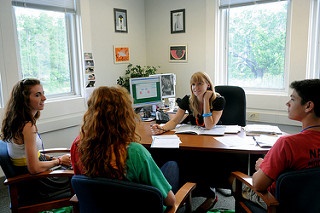
Flickr user Tulane Public Relations
Academic advisors (sometimes called college counselors) are one of the greatest resources for college students. Libraries can help with research projects, writing centers can help with essays, academic advisors can help with your entire college career—from classes, to programs, to career prep.
Here are a few tips and tricks to meeting with a college academic advisor for the first time.
DO: Get to know them, and vice versa
Your college academic advisors will be your go-to guide for your college career. They can help you determine the right classes to take, which professors to talk to, programs or tracks to consider, and even present career options you haven’t thought about.
The best way to help you, is by having them know you. So when you meet with them for the first time, tell them about yourself. Tell them your passions, your career aspirations, what you’re interested in studying. The more they know about you, the better equipped they will be to aid you.
DON’T: Assume it’s a one-and-done meeting
Many colleges have a mandatory meeting for freshmen and their first-year advisors. Some students see this more as a mild inconvenience than the helpful opportunity that it is. Assuming that you can “get the meeting out of the way and not worry about it again” is a mistake.
Advisors will be perhaps the best resource you’ll ever have on campus. When you’re trying to decide between two classes to take, or are unsure you want to keep pursuing your current major, or have no idea what you really want to do when you graduate–you go to your advisor. That’s what they’re there for.
DO: Keep an open mind
Your advisor is there to not only help you achieve your goals, but consider additional or even brand new ones. They have the resources, connections, and know-how to show you new options or different takes on what you’re interested in. Listen to them. Even if you don’t love every suggestion or don’t follow through, it’s important to keep and open mind. You never know what might happen—you could end up studying for a new dream job you never considered!
DON’T: Think you know better
You might have a plan, but plans change. Even if you’re certain of what you want to do when you graduate, don’t assume that you know the industry (or the path to get there) better than your advisor. They’re pros at what they do, so listen up. By ignoring their advice or not even considering the things they tell you, you squander a great resource that is willing and dedicated to helping you out.
DO: Take notes
We’ve all had those moments where we think “I don’t need to write this down, I’ll just remember it” and end up regretting that. Don’t have your meeting with your advisor be one of those moments. Bring a notebook with you to your meeting and take thorough notes, even if the advisor promises to email material to you.
They’ll be chock full of advice and suggestions, as well as behind-the-scenes tips and tricks for navigating your school’s class registry. It’s always good to jot down notes, even if only to really cement it in your mind.
DON’T: Forget to follow up
Like we said earlier, meeting with your advisors (among other tips) is not a one-and-done thing. In fact, you should meet regularly with your advisors—especially before class registration for the next semester. They’re busy during this time, so make sure to book a meeting in advance. Even after a meeting, it’s always good to send a follow up email in thanks or to clarify any lingering questions.
We can’t emphasize enough how important it is to meet with your advisor and really take advantage of their help. They can help guide you through the confusion and hardships of college, if you let them.
It’s also important to find a college that “fits” your own interests and needs. With College Raptor, you can easily discover personalized college matches for FREE!






